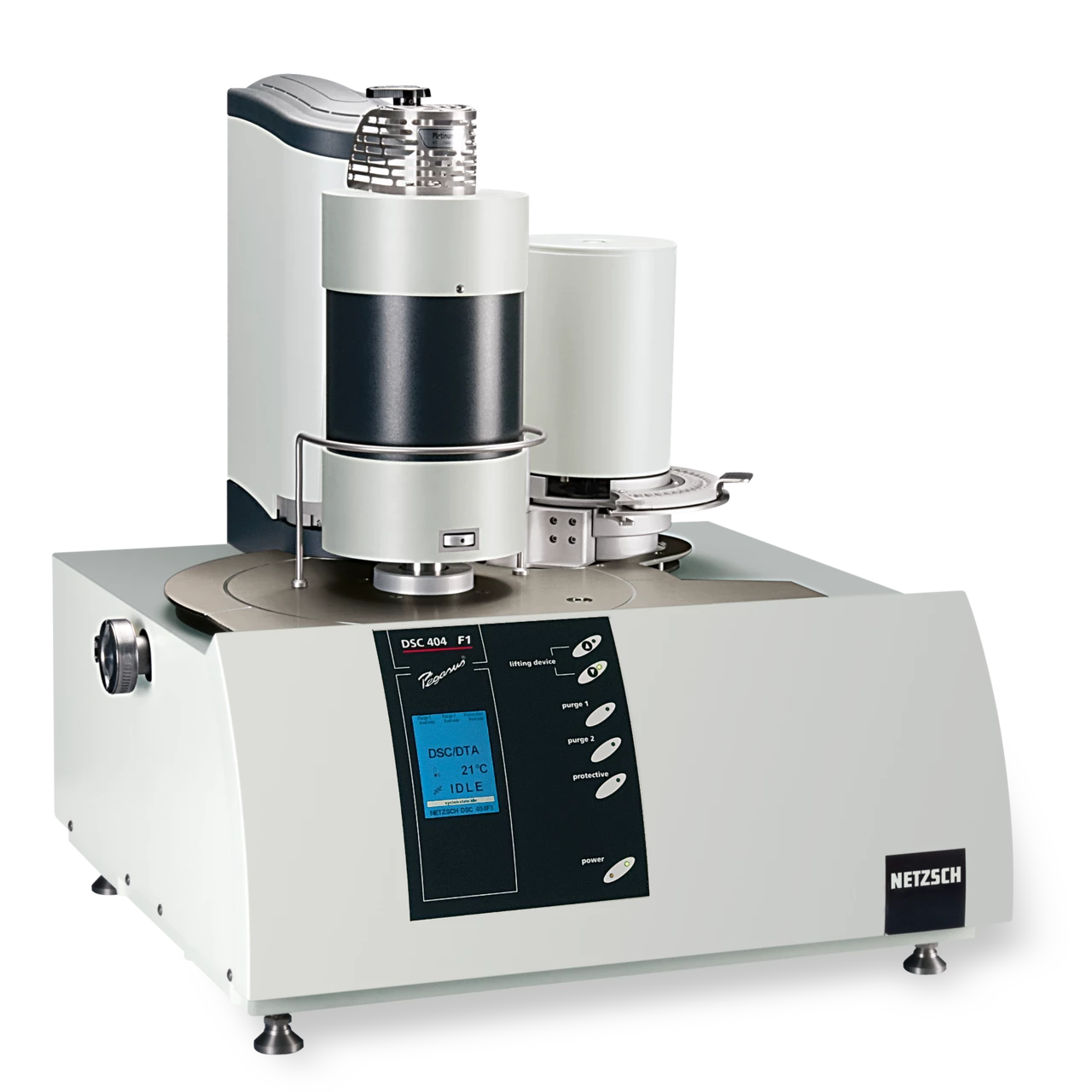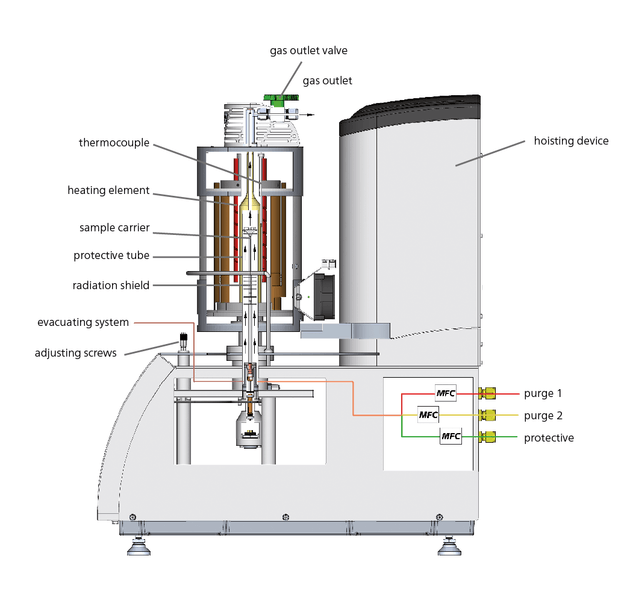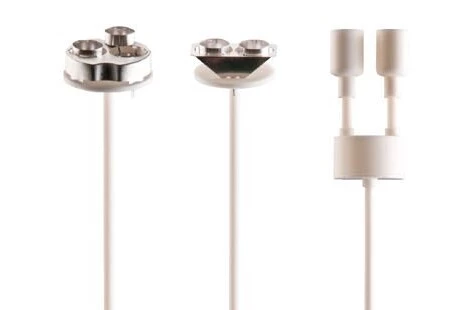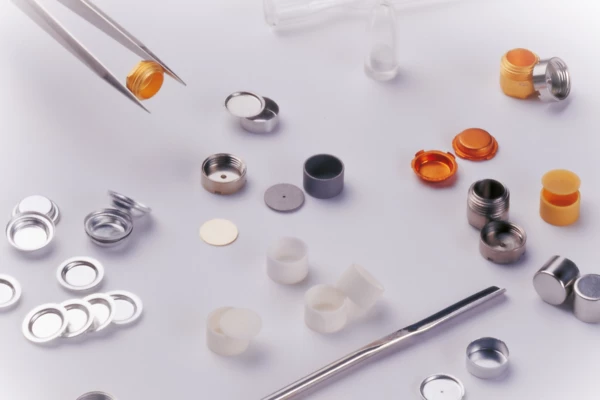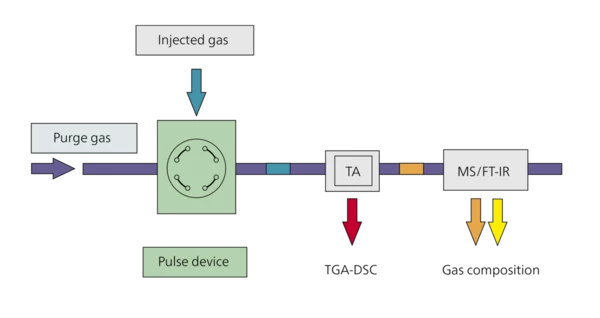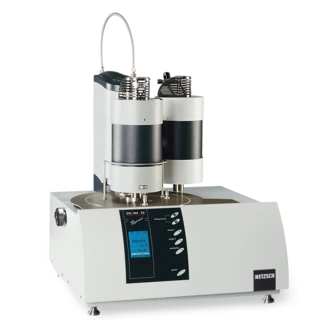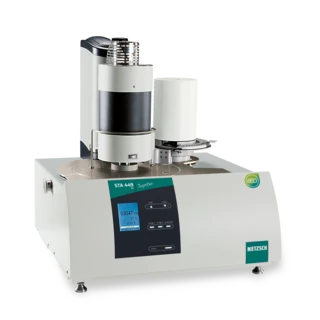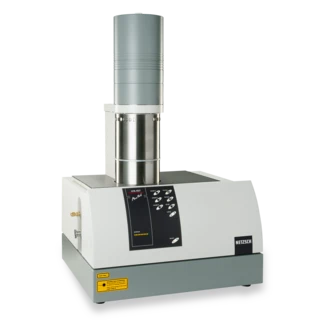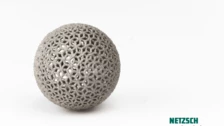Highlights
Una flexibilidad fascinante en Análisis Térmico
El DSC 404 F1 Pegasus® (Calorímetro de barrido diferencial) ha sido diseñado para la determinación exacta del calor específico de materiales de altas prestaciones a altas temperaturas.
- Determinación de propiedades termodinámicas de cerámicas y materiales metálicos de altas prestaciones
- Realización de estudios cuantitativos de entalpía y cp en atmósferas de gases puros o bajo condiciones de vacío (hasta 10-4 mbar)
- Caracterización de metales amorfos, aleaciones con memoria de forma, y cristales inorgánicos
DSC 404 F1 Pegasus® es sinónimo de la más alta flexibilidad, calidad excelente y prestaciones óptimas.

NETZSCH at the Max-Planck Institute
How is the Max-Planck Institute for Chemical Physics of Solids using the NETZSCH DSC 404 Pegasus®??
Method
El DSC 404 F1 Pegasus® (Calorímetro de barrido diferencial) incluye DSC con flujo calorífico de alta capacidad par alas medidas en aplicaciones altamente sofisticadas.
El concepto del DSC 404 F1 Pegasus® se puede configurar con ocho tipos distintos de hornos, que son fácilmente intercambiables por el usuario, para trabajar en un amplio rango de temperatures, desde -150ºC a 2000ºC.
Se ofrecen distintos sensores, para medidas DSC (Calorimetría diferencial de barrido) y DTA (ATD: Análisis térmico diferencial), también se dispone de varios tipos de crisoles y de una gran variedad de accesorios técnicos.
Se puede acoplar sin problemas a un espectrómetro de masas o a un FT-IR.
Una extensión del hardware como el intercambiador automático de muestras (ASC) capaz de alojar hasta 20 muestras y crisoles de referencia; algunas capacidades del software, como BeFlat® para la eliminación de la línea de base optimizada; así como la opción de modulación de temperatura de la señal DSC (TM-DSC), hacen del DSC 404F1 Pegasus® el DSC más versátil para Investigación y Desarrollo, control de calidad, análisis de fallos, y optimización de procesos.
El DSC 404 F1 Pegasus® (Calorímetro de barrido diferencial) es la herramienta ideal para su trabajo diario en el laboratorio.
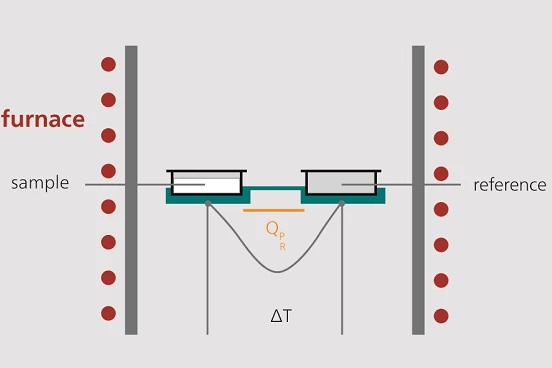
More on the Functional Principle of a Heat-Flux DSC
A DSC measuring cell consists of a furnace and an integrated heat-flux sensor with designated positions for the sample and reference pans.
The sensor areas are connected to thermocouples or may even be part of the thermocouple. This allows for recording both the temperature difference between the sample and reference side (DSC signal) and the absolute temperature of the sample or reference side.
Due to the heat capacity (cp) of the sample, the reference side (usually an empty pan) generally heats faster than the sample side during heating of the DSC measuring cell; i.e., the reference temperature (TR, green) increases a bit faster than the sample temperature (TP, red). The two curves exhibit parallel behavior during heating at a constant heating rate – until a sample reaction occurs. In the case shown here, the sample starts to melt at t1. The temperature of the sample does not change during melting; the temperature of the reference side, however, remains unaffected and continues exhibiting a linear increase. When melting is completed, the sample temperature also begins to increase again and, beginning with the point in time t2, again exhibits a linear increase.
The differential signal (ΔT) of the two temperature curves is presented in the lower part of the image. In the middle section of the curve, calculation of the differences generates a peak (blue) representing the endothermic melting process. Depending on whether the reference temperature was subtracted from the sample temperature or vice versa during this calculation, the generated peak may point upward or downward in the graphs. The peak area is correlated with the heat content of the transition (enthalpy in J/g).
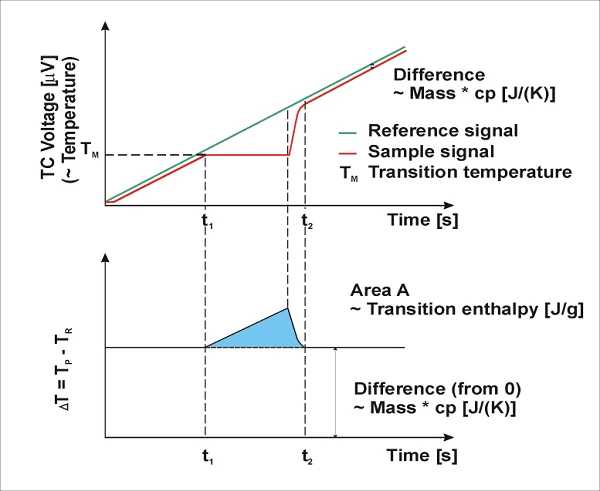
Specifications
Datos Técnicos
Los sensores DSC cp permiten determinar el calor específico, de forma extremadamente precisa
de RT a 1500°C: ± 3.5%
Horno
Horno de Tungsteno (RT ... 2000ºC)
Sistema OTS®® (opcional)
Software
Proteus®: Excellent Thermal Analysis Software
The DSC 404 F1 Pegasus® runs under Proteus® Software on Windows®. The Proteus® Software includes everything you need to carry out a measurement and evaluate the resulting data. Through the combination of easy-to-understand menus and automated routines, a tool has been created that is extremely user-friendly and, at the same time, allows sophisticated analysis. The Proteus® Software is licensed with the instrument and can of course be installed on other computer systems.
DSC features:
- Determination of onset, peak, inflection and end temperatures
- Automatic peak search
- Transformation enthalpies: analysis of peak areas (enthalpies) with selectable baseline and partial peak area analysis
Complex peak analysis with all characteristic temperatures, area, peak height and half-width - Comprehensive Temperatura de Transición VítreaThe glass transition is one of the most important properties of amorphous and semi-crystalline materials, e.g., inorganic glasses, amorphous metals, polymers, pharmaceuticals and food ingredients, etc., and describes the temperature region where the mechanical properties of the materials change from hard and brittle to more soft, deformable or rubbery.glass transition analysis
- BeFlat® for Automatic baseline correction
- Degree of crystallinity
- Oxidative-Induction Time (OIT) and Oxidative-Onset Temperature (OOT)Oxidative Induction Time (isothermal OIT) is a relative measure of the resistance of a (stabilized) material to oxidative decomposition. Oxidative-Induction Temperature (dynamic OIT) or Oxidative-Onset Temperature (OOT) is a relative measure of the resistance of a (stabilized) material to oxidative decomposition.OIT (oxidative induction time) evaluation
- DSC correction: evaluation of exo- and endothermal effects under consideration of system time constants and thermal resistance values
- Tau-R®Mode: takes into account the time constant and thermal resistance of the instrument and reveals thus sharper DSC effects from the sample
Further Advanced Software Options
The Proteus® modules and expert software solutions offer further advanced processing of the thermoanalytical data for more sophisticated analyses.

Consultancy & Sales
Do you have further questions about the instrument, the method and would you like to speak to a sales representative?
Service & Support
Do you already have an instrument and need technical support or spare parts?
